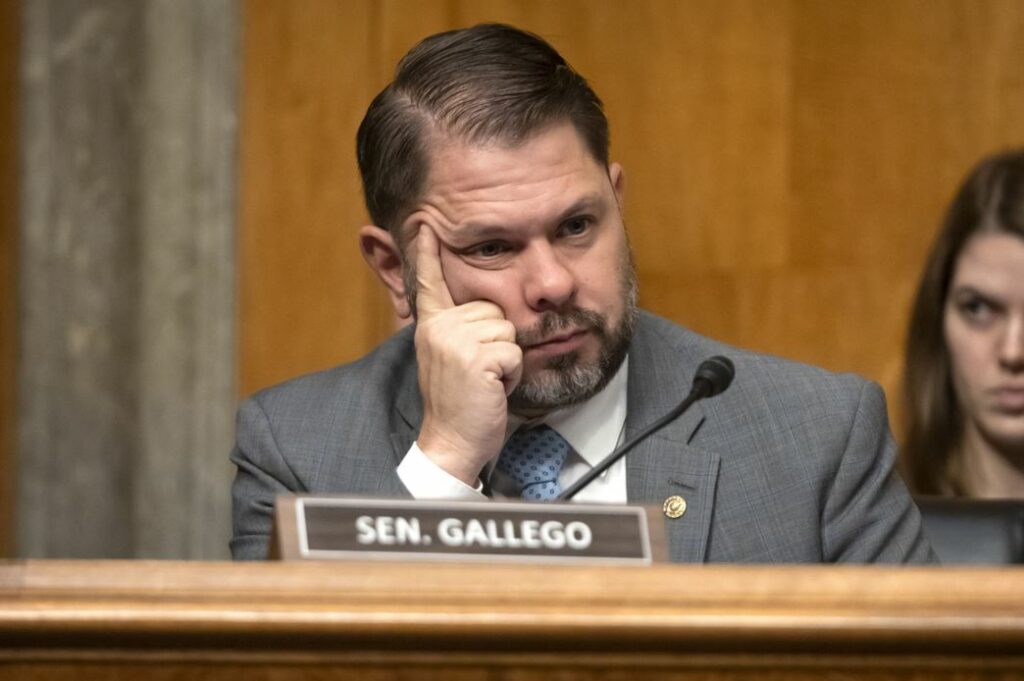
In a surprising political twist, a group of Senate Democrats has reversed their stance on a landmark Senate crypto bill, threatening its path forward just days before its expected floor debate. Once seen as a rare bipartisan opportunity to regulate the rapidly growing crypto industry, the bill is now at risk of stalling due to renewed concerns from lawmakers who had previously supported it.

What Happened?
On Saturday, May 4, nine Senate Democrats released a joint statement announcing they would oppose the current version of the Senate crypto bill if it reaches the Senate floor. Among the signatories were Senators Ruben Gallego (Arizona), Mark Warner (Virginia), Lisa Blunt Rochester (Delaware), and Andy Kim (New Jersey), all of whom had previously voted in favor of the bill when it passed through the Senate Banking Committee in March.
The senators expressed concern that the bill still contains “numerous issues that must be addressed” and stated that they would not support cloture, the procedural step required to bring the legislation to a vote, if their demands for revisions were not met.
What’s at Stake?
The Senate crypto bill, spearheaded by Republican Senator Bill Hagerty of Tennessee, aims to create the United States’ first comprehensive regulatory framework for stablecoins. These are digital assets pegged to traditional currencies like the U.S. dollar and have grown significantly in use and visibility within the financial system.
If passed, the legislation would represent a milestone for the crypto industry, offering long-sought legal clarity and potentially spurring greater adoption. The bill needs support from at least seven Democrats to pass in the Senate—a threshold that may now be out of reach given the opposition from these nine senators.
What Are the Concerns?
In their statement, the Democrats emphasized that the Senate crypto bill must include “stronger provisions on anti-money laundering, foreign issuers, national security, preserving the safety and soundness of our financial system, and accountability for those who don’t meet the act’s requirements.”
They acknowledged the bill’s potential and said they remain open to working with colleagues across the aisle to resolve their concerns. “As stablecoins continue to grow in popularity, it is critical for Congress to work in a bipartisan fashion to create a regulatory framework that sets forth clear rules of the road,” the statement read.
The lawmakers argued that while regulation is urgently needed to protect consumers from fraud and abuse, the current version of the bill doesn’t go far enough to ensure safety and security in the financial system.
Political Dynamics and Crypto Ties
This latest development reflects growing complexity in the politics surrounding digital assets. While the crypto industry has historically enjoyed bipartisan support, recent associations between prominent Republican figures and crypto ventures, particularly involving members of the Trump family, have raised eyebrows among Democrats.
One new venture from the Trump family reportedly plans to launch its own stablecoin. Critics fear this could create conflicts of interest or raise questions about the integrity of future legislation, including the Senate crypto bill.
Industry Impact and Next Steps
The crypto industry had been optimistic about the Senate crypto bill’s chances, especially after it cleared the Senate Banking Committee. Many believed that recent amendments made to the bill would be enough to secure broader Democratic support. Those changes targeted key issues previously raised by lawmakers, such as consumer protection and financial transparency.
However, with the latest reversal, Democrats have gained new leverage to push for additional modifications before a floor vote takes place. A procedural vote on the legislation could happen as early as next week, making the coming days critical for negotiations.
Notably, two Democrats who co-sponsored the bill—Sen. Kirsten Gillibrand (New York) and Sen. Angela Alsobrooks (Maryland) did not sign the opposition letter, signaling that not all Democrats are united in their concerns.
Hagerty Responds
In response to the Democratic opposition, Senator Hagerty defended the Senate crypto bill’s intent and emphasized the need for swift action. He called on his colleagues to prioritize American leadership in the digital economy and protect the dominance of the U.S. dollar.
“We must advance legislation that enshrines American leadership in the digital asset space and protects the U.S. dollar for centuries to come,” Hagerty wrote. “That time is now. We have a choice here. Move forward and make any remaining changes needed in a bipartisan way, or show that digital asset and crypto legislation remains a solely Republican issue.”
What’s Next?
The stablecoin debate is far from over. With rising public interest in digital currencies and mounting pressure for regulatory oversight, lawmakers on both sides recognize the need for action. However, Saturday’s announcement reveals just how difficult bipartisan compromise remains, especially in a politically charged environment.
If Democrats and Republicans can find common ground, the Senate crypto bill could still pass and offer the crypto sector much-needed regulatory clarity. However, if disagreements persist, the U.S. may once again delay setting clear rules for one of the most rapidly evolving sectors in modern finance.
One thing is clear: the road to crypto regulation in the U.S. remains long, winding, and full of unexpected turns.























